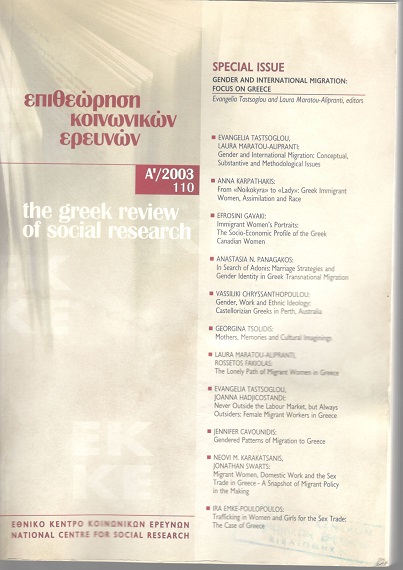Gender, work and ethnic ideology: castellorizian Greeks in Perth, Australia
Abstract
This article analyses the values and practices surrounding work among the Castellorizian migrants of Perth, Western Australia. The article compares and analyses the occupational and class patterns of the Castellorizians of Perth and those of their original community on the island of Castellorizo, to focus upon the construction of Castellorizian ethnic identity. Castellorizian men, with an occupational background in business and the professions, selectively deploy elements of regional Castellorizian tradition and of Greek ethnic ideology, to emphasize their material success in Perth. Castellorizian women, on the other hand, stress the need to abstain from paid labour, while their children are young, and motherhood as a channel for the socialization of their children into Greek culture. This case study demonstrates that the Castellorizian elite of Perth hegemonically defines the historically grounded and gendered ethnic ideology that underlies Castellorizian ethnic identity. This ideology is open and inclusive and incorporates the predominant values and practices of the surrounding Australian society.
Article Details
- How to Cite
-
Chryssanthopoulou, V. (2003). Gender, work and ethnic ideology: castellorizian Greeks in Perth, Australia. The Greek Review of Social Research, 110, 107–140. https://doi.org/10.12681/grsr.9168
- Section
- Articles

This work is licensed under a Creative Commons Attribution-NonCommercial 4.0 International License.
Authors who publish with this journal agree to the following terms:
- Authors retain copyright and grant the journal right of first publication with the work simultaneously licensed under a Creative Commons Attribution Non-Commercial License that allows others to share the work with an acknowledgement of the work's authorship and initial publication in this journal.
- Authors are able to enter into separate, additional contractual arrangements for the non-exclusive distribution of the journal's published version of the work (e.g. post it to an institutional repository or publish it in a book), with an acknowledgement of its initial publication in this journal.
- Authors are permitted and encouraged to post their work online (preferably in institutional repositories or on their website) prior to and during the submission process, as it can lead to productive exchanges, as well as earlier and greater citation of published work (See The Effect of Open Access).



